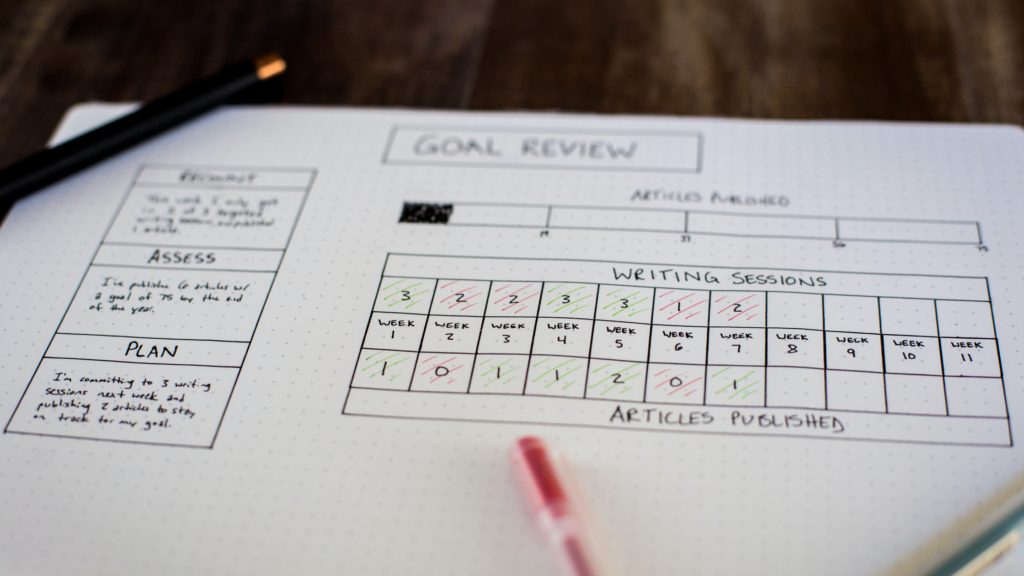We humans set all kinds of goals for ourselves, whether we’re aware of it or not. For example, “I’m going to make dinner by 7 tonight,” is, in fact, a goal. But when we talk about setting goals, we’re usually talking about more conscious efforts – drinking more water, finishing a book, traveling the world. So the question remains: how often do YOU set goals for yourself?
There are two schools of thought in goal setting: what I like to call Annual Goals and Continual Goals.
People who favor Annual Goals pick one time of year to lay out their goals for the year. They might be fans of New Year’s Resolutions. Or they might remember the first day of school in September fondly as a time of new beginnings and center their calendar around that time. Either way, they set all their goals at one time in the year and spend the rest of the year working toward them.
On the other hand, fans of Continual Goals set goals whenever they’re inspired and fit them in through constant prioritization.
Do either of these sound familiar to you? Let’s look at each of them in-depth so you can be sure to structure your goals to fit!
How Often Do You Set Goals for Yourself? Annually!
If you’re an Annual Goal setter, you’re a fan of the feeling of opportunity that comes with a particular time of year. Maybe the feeling is driven by fond memories from the freshly sharpened pencils and unsullied notebooks from the first day of school, or the clean slate of New Year’s Day. No matter your reasoning, there’s a Day 1 of your goals, and you’re willing to wait for it.
As an Annual Goal person, you should be sure that you’re setting real goals, not just resolutions (see here for some reasons why). Your start date only comes once, so you want to make sure you’re getting it right.
But goals don’t work on a set-it-and-forget-it system. Those goals aren’t going to achieve themselves! In order to ensure that you’re on track and making progress toward your goals, I have some tips for you.
Set SMART goals.
I’m going to point you back toward this post for some guidance on that, but for a tl;dr: make sure you have a specific result in mind, with a time frame attached to it. “Exercise more” gives you no information on whether you’re crushing your goal or not – “Spend 20% more time at the gym this year” does, though!
Check in with your goals regularly!
A year is a long time and it’s easy to lose track of the finish line. Make sure you’re checking in on your goals regularly – monthly or weekly check-ins can keep you on track – I wrote about how to set weekly goals here.
Another great way to keep track of your progress is to make it visual. Remember elementary school canned food drives? My school always had thermometer-style trackers that we would color in as we got closer to our goal. There’s no reason why you can’t make one of those for your annual goals! Hang it somewhere you’ll see it every day to really keep your goal in mind.
Don’t be afraid to pivot
“…in this world, nothing can be said to be certain, except death and taxes.”
-Ben Franklin (because of course it was)
You can never be sure of what the year is going to throw at you (I’m looking at you, COVID-19), so don’t shy away from adjusting what your goals are. If you had a goal of reading 20 books in a year, but check in in August to find you’ve only read 8, it might be time to reevaluate that goal. Take a minute and think about why you set that goal – did you want to be able to talk with friends about the books you’ve read? Were you trying to reinvigorate a love of recreational reading? Or were you trying to learn about a particular topic? When you adjust your goal, make sure you’re adjusting toward what you want to accomplish and who you want to be – not just punishing yourself for not achieving it yet.
But what if you’re not the kind of person to pick one time of year to set your goals? Let’s look at the Continual Goal person.

No matter how you set your goals, tracking is key!
How Often Do You Set Goals for Yourself? Continually!
Personally, I’m a scanner personality (read a bit about that here), so I see opportunities for learning and exploration everywhere I look. Therefore, I keep a running list of goals in my personal scrum board so they’re all in one place. This allows me to prioritize them and actually take action on them when I have time.
Being a Continual Goal person means that when you see an opportunity you want to work on, you want to set a goal and get going on it right away. The world is your oyster, and waiting for the right time to start is only going to slow you down.
But there are some things to keep in mind as you build your continual goals.
Prioritization is Key
When you can start a goal at any time, it can quickly get out of hand. Working on too many things at once will keep you from making any noticeable progress on any one thing, but if you focus on only one thing at a time, you might feel like you’re neglecting your other interests. What’s a person to do?
Simple: prioritize. You’re going to get more done if you’re only focusing on 1-3 things at a time. And if you’re getting things done (and I mean Ts-crossed-Is-dotted DONE), you’ll be able to cross things off the list!
Trust me on this one.
A Review System Will Keep You Focused
Annual Goal setters might find the idea of Continual Goal setting to be chaotic – when are the start and end dates?! To this end, a consistent review system is the Continual Goal setter’s best friend. You might choose monthly, weekly, or even daily check-ins with your goals, but having them regularly is what really matters. Check out this post here about how to set weekly goals for yourself.
The keys to a good review system are as follows:
- Do it simply: the easier it is to check up on your goals, the more likely you’ll do it!
- Do it often: figure out the right cadence for you to check in on your goals. For some people, weekly might be just right. For others, monthly is going to be the Goldilocks time period.
- Do it consistently: do I need to elaborate on this one? It’s not a system if you only do it once!
A good review system will make your prioritization worth it. It’s how you take action on the things that you’re focused on, and ensure that you continue taking action after the initial excitement of starting wears off.
Know When to Quit
This is the hardest one for me, so know that this advice is partially for me, too. Being a Continual Goal setter means that I constantly have goals flowing into my life – but no expiration date for them. The Annual Goal setter has one time per year when they sit down and list out goals, weeding out those that no longer entice them.
My best advice here is to take a minute and examine the other priorities in your life every time you start something new. Are they all still relevant to your life? Do you still want to do them? Do you still want to do them MORE than the other things in your life?
If the answer to all three of those questions are yes, then have at it! Otherwise, know that strategic reevaluation (ahem, quitting) isn’t a sign of failure – it’s a sign of realignment.
However you set goals, I hope you have some new ways to examine your approach them!



